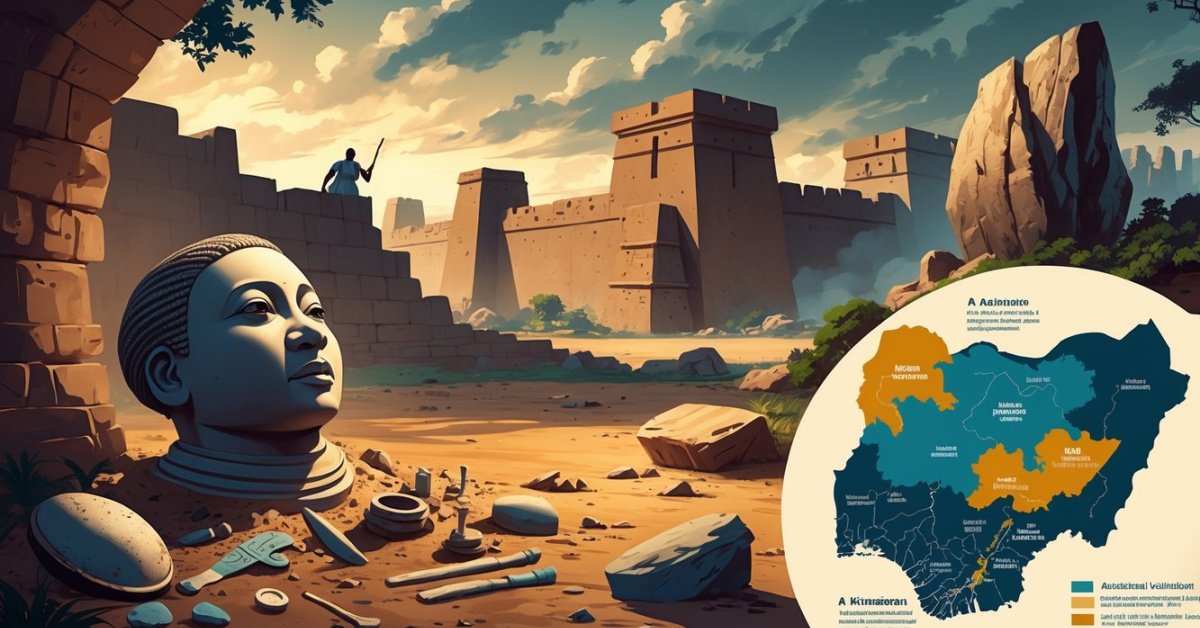Nigeria, known for its rich history and vibrant culture, is also a land full of fascinating mysteries that have puzzled people for generations. Some of the biggest historical mysteries in Nigeria include unexplained disappearances, ancient lost cities, mysterious deaths, and baffling folklore that remain unsolved to this day.
These mysteries go beyond ordinary stories—they are part of the country’s identity. They invite anyone with a curious mind to explore further.

Across Africa, few countries have tales as intriguing as Nigeria. These mysteries range from shocking events like the disappearance of the Chibok girls and the strange case of General Sani Abacha’s death to ancient places steeped in legend and superstition.
Sites like sacred groves and haunted houses add another layer to Nigeria’s reputation for the unknown. Whether someone loves history or simply enjoys a good mystery, they will find that Nigeria offers stories that are both thrilling and thought-provoking.
Each case reveals a piece of history that still leaves Nigerians and visitors alike asking questions.
Ancient Cities and Lost Civilizations

Nigeria is home to impressive ancient cities and cultures with mysterious beginnings and unexplained endings. These places tell stories about skilled artists, thriving civilizations, and unanswered questions in Nigeria’s past.
The Enigma of Ife’s Origins
Ife is a famous city known as the spiritual heart of the Yoruba people. Its history goes back over a thousand years, yet no one is sure exactly how it began.
Archaeologists have found beautiful bronze and terracotta artworks in Ife. These artifacts show advanced skills, but there are few written records explaining who first settled the city.
Many believe Ife is the cradle of the Yoruba civilization. Legends say gods once walked the earth here, but historians still debate the truth.
The city’s detailed sculptures—especially the Ife heads—display artistic techniques that seem ahead of their time. Even today, Ife’s rise and early culture remain one of the biggest mysteries in the history of Nigeria.
Nok Culture and Disappearance
The Nok culture existed long before many other known Nigerian kingdoms. Archaeologists discovered traces of this society in central Nigeria.
The Nok people are most famous for their life-like terracotta figures and advanced iron-smelting skills. Nok settlements date as far back as 1000 BC.
For centuries, they flourished, leaving behind unique art and clues about their daily life. Then, around 300 AD, the Nok seemingly vanished.
Experts still do not know why or how this powerful early society ended. The reasons for the sudden disappearance—whether war, disease, climate change, or migration—are all uncertain, making the Nok civilization a fascinating subject for researchers.
Unsolved Political Mysteries

Nigeria’s political history is filled with high-profile events that left the nation with more questions than answers. Some of these moments involve the mysterious circumstances around the deaths of top leaders and unusual changes in power.
The Death of General Sani Abacha
General Sani Abacha was Nigeria’s military ruler from 1993 until his sudden death in 1998. His passing shocked many people in Nigeria and around the world.
The official report said he died of a heart attack, but for years, people wondered if this was true. Rumors quickly spread that Abacha may have been poisoned during a late-night gathering at the Presidential Villa in Abuja.
Others pointed to the possibility of foul play because of his tough grip on power and the number of enemies he had, both inside and outside the country. No official investigation ever fully explained what happened to Abacha.
Many Nigerians feel the truth about his death was never made public. The mysterious passing of General Abacha is often listed among the top unsolved political assassinations in Nigeria’s history.
The Fate of President Yar’adua
President Umaru Musa Yar’adua was Nigeria’s elected leader from 2007 until his death in 2010. His time in office was troubled by serious health problems.
In 2009, he left Nigeria suddenly for medical treatment in Saudi Arabia, but almost no details about his condition were shared with the public. For months, Nigerians received little information about their president.
Decisions in government were delayed, leading to a power struggle. The vice president, Goodluck Jonathan, eventually became acting president after much debate.
Yar’adua’s actual medical condition was never fully revealed. When he died in May 2010, Nigerians were left wondering about the real story behind his illness and how power was handled during his absence.
The way the situation was managed is still seen as one of Nigeria’s most controversial political moments.
Famous Unresolved Disappearances

Nigeria has faced several disappearances that remain unexplained. These cases have affected families and sparked national and international attention.
The most well-known cases involve schoolgirls and civilians lost during conflict.
The Chibok Girls Kidnapping
In April 2014, nearly 300 schoolgirls were taken from their school in Chibok, Borno State. The extremist group Boko Haram claimed responsibility for the abduction.
The event drew worldwide media coverage and led to the creation of the global Bring Back Our Girls campaign. While some girls managed to escape, and others were rescued in later years, more than 90 remain missing.
Many families still do not know what happened to their loved ones. The kidnapping highlighted rising insecurity in northeast Nigeria and raised questions about the government’s response to mass abductions.
It is still considered one of the most mysterious disappearances in Nigeria.
Missing People During the Civil War
Between 1967 and 1970, Nigeria fought a brutal civil war, also known as the Biafran War. During the conflict, thousands of people disappeared, including both civilians and soldiers.
Some fled due to the fighting, while others were caught up in violence or forced into hiding. Many families were separated with no news of their missing relatives.
War records were incomplete or destroyed, making it very hard to trace what happened. Even today, people still search for information about family members lost during the war.
The mystery of these disappearances remains part of Nigeria’s painful past.
Historical Mystery Events in Warfare

Nigeria’s history includes conflict and political changes that have shaped its future. Some battles and power shifts remain surrounded by confusion, missing information, or disputed stories, especially in times of war and coups.
Unknowns of the Biafran War
The Biafran War, also called the Nigerian Civil War, began in 1967 after the southeast region tried to break away as the Republic of Biafra. This conflict, which lasted until 1970, involved many groups, including the Federal Republic of Nigeria led by General Yakubu Gowon.
One major mystery is the real number of lives lost, as estimates range from one to three million deaths. Many deaths were due to famine, yet records are unclear and numbers remain debated.
Reports about what really happened during some key battles still conflict. Stories of hidden arms supplies, secret foreign support, and missing official records continue to stir debate.
Some believe that deals were made between leaders but never revealed, making it hard to know the full truth. Many questions also remain about how both sides managed or hid news from the world, which led to confusion about key events.
More information can be found about major wars and conflicts in Nigeria at Wars, Conflicts, and Coups of Nigeria.
Secrets of the First Military Coup
Nigeria’s first military coup happened in January 1966 and changed the country forever. Led by young army officers, the coup aimed to overthrow the civilian government in hopes of stopping corruption and unrest.
However, many facts about the coup remain hidden or disputed. For example, the group’s full plans and all the people involved are still not fully clear even today.
Some officers escaped, and their real roles are still argued about. After the coup, a quick counter-coup followed, bringing General Yakubu Gowon to power.
Rumors suggested secret agreements between the army and some politicians, but few documents prove what really happened. Lists of events like this can be explored at 30 Noteworthy Events in Nigeria’s History.
People also wonder about the sudden violence in some regions compared to others, and why certain leaders survived while others did not. These gaps in knowledge make the first military coup one of Nigeria’s lasting mysteries.
Controversial Political Decisions

Nigerian history is filled with political moments that changed the direction of the country. Some decisions left a trail of confusion, disputes, and debates that still spark conversations today.
The Babangida Annulment
In June 1993, General Ibrahim Babangida oversaw the most controversial action in Nigeria’s political scene. After the country held what many called the fairest national election in its history, Babangida annulled the outcome before a winner could be officially declared.
The election was expected to bring in Chief Moshood Abiola as the next president. Many Nigerians believed he won, but Babangida’s annulment threw the nation into chaos and led to protests and unrest.
The reasons given for the annulment were never fully explained, leaving many to question the real motives behind the move. This single decision is still discussed today as one of the country’s top controversial political moments.
It ended Nigeria’s Third Republic dream and set the stage for continued military rule.
Unanswered Questions on Fourth Republic Elections
After years of military rule, Nigeria entered its Fourth Republic in 1999. This period was marked by the promise of democracy and new national elections.
However, controversy quickly surrounded several elections due to reports of rigging, violence, and missing or ignored results. Allegations of voter intimidation and manipulation arose during key presidential and state-level contests.
Many Nigerians and observers claimed that the process was not transparent or fair. This led to mistrust in the system and doubts about the legitimacy of government officials.
The most controversial presidential elections of this era are still cited as examples of the challenges facing Nigeria’s democracy. These unresolved issues have left voters waiting for clearer answers and more trustworthy elections.
Colonial Era Conundrums

The colonial era left Nigeria with many unanswered questions about how it was shaped. Some mysteries focus on key figures and the struggles over land and resources.
The Role of Lord Lugard in Nigerian Unity
Sir Frederick Lugard played a big part in Nigeria’s colonial history. As the British governor, he joined the north and south regions in 1914.
Many people still wonder if this unification made Nigeria stronger or caused more problems. Some historians note that he wanted to increase British control and improve trade.
However, the new borders forced many different groups to live together. This sometimes led to conflict over power and resources.
Resistance to Lugard’s decisions was strong in some areas. Local leaders and people did not always agree with these changes.
Many continue to discuss if Lugard’s choices helped build a united Nigeria or made it harder to govern.
Sand, Rock, and Resource Mysteries
During colonial rule, the British focused on Nigeria’s natural resources. Rivers, rocks, and sand played key roles in trade and transport.
Some areas, such as the Niger Delta, became centers for exports like palm oil and minerals. Colonial officers mapped new places to find more resources.
These efforts sometimes caused disputes over sand, rock, and land control between local communities and the British. Many believe these resource struggles still affect Nigeria today.
Trade routes often changed due to river access and rocky regions. Locals resisted changes that threatened their control over economic zones.
Mysteries of Social Movements

Social movements in Nigerian history often left unanswered questions. Some events changed the nation’s direction and are still discussed today for their mysterious circumstances.
The Aba Women’s Riot Puzzle
The Aba Women’s Riot of 1929 holds a unique place in Nigerian history. Thousands of Igbo women united to protest against colonial tax policies.
In some reports, the exact reason for their sudden mass mobilization remains unclear. Historians still question how the women organized so quickly, with little outside help.
Some local stories suggest secret communication networks, but there is little evidence to explain their effectiveness. The confusion over the true spark and the long-term effects of the protest continues to attract curiosity.
Its impact went beyond tax issues, inspiring later movements for women’s rights and independence. More on the Aba Women’s Riot.
National Youth Service Corps: Unanswered Questions
The National Youth Service Corps (NYSC) began in 1973 to unite Nigeria after the civil war. Each year, thousands of graduates serve across the country.
Mysteries surround how the program’s goals are tracked and if it still meets its original purpose. People question whether the NYSC actually helps reduce divisions between regions and ethnic groups.
Debates continue about safety, its influence on national identity, and why some changes are resisted despite complaints. Many still wonder about the reasons behind some strict rules and the transparency of posting decisions.
Legal and Territorial Mysteries

Nigeria’s history features deep legal debates and tough land disputes. These issues have shaped national identity and sparked intense public discussions.
The Sharia Law Debate
The use of sharia law is one of Nigeria’s most discussed legal mysteries. Sharia is Islamic law, and some northern Nigerian states officially introduced it starting in 1999.
This caused confusion and debate across the country. People asked if Nigeria, a secular country, should allow religious law in its court system.
Some saw the implementation as a return to tradition and a way to reduce crime. Others worried it would threaten the rights of non-Muslims and conflict with Nigeria’s constitution.
Several states adopted stricter sharia punishments, including amputations and floggings. These punishments led to legal battles and violence in some areas.
The Nigerian legal system still struggles with how sharia fits with federal law.
The Bakassi Peninsula Dispute
The Bakassi Peninsula, rich in oil and fish, became a major territorial mystery between Nigeria and Cameroon. People from both countries claimed the land, causing problems for villagers living there.
In 2002, the International Court of Justice gave the peninsula to Cameroon. Nigeria disagreed with the decision, and many Nigerians living in Bakassi felt shocked and abandoned.
Even after Nigeria handed over the territory in 2008, disputes and tension continued. Residents worried about losing their homes and citizenship.
Some moved to new towns in Nigeria, while others stayed and faced uncertainty about their rights. The Bakassi issue shows how borders drawn by outsiders can have serious effects.
Learn more about important events in Nigeria’s history.
Financial and Institutional Secrets

Nigeria’s past is filled with financial decisions and claims that sparked debate. Some government bodies faced public scrutiny for unusual events, missing documents, or unresolved financial transactions.
Central Bank of Nigeria Controversies
The Central Bank of Nigeria plays a major role in the country’s economy. Several controversies have affected its reputation over the years.
The bank has faced debates about missing money and unclear policies. Unexplained loss of funds has raised public outcry, with accusations of a lack of transparency.
Questions still surround certain records during foreign exchange crises and the management of government reserves during the Structural Adjustment Programme. Key moments in the evolution of the Nigerian financial system have triggered calls for proper auditing.
Allegations sometimes involve staff or officials, creating suspicion about internal operations. National headlines have covered stories involving secretive deals or late-night decisions.
Each incident adds to Nigeria’s history of financial secrecy and challenges with public trust.
Controversy Highlights:
| Year | Issue Raised | Public Response |
|---|---|---|
| 1980s | SAP and Reserve Management | Demand for transparency |
| 2014 | Missing Oil Revenue | Parliamentary inquiry |
| 2020s | Forex Allocation Scandals | Media investigations |
Unresolved Police Mysteries
The Nigerian police have been linked to cases that remain unresolved for decades. These incidents often involve unclear investigations, sudden disappearances, and missing case files.
Families and communities raise concerns about missing persons or unexplained deaths after police interactions. Some stories tell of evidence vanishing while under official watch, making prosecution difficult.
Notable examples include unresolved murder cases and clandestine financial dealings involving police leadership. Suspects sometimes escaped custody, or entire case files disappeared, making justice harder to achieve.
National discussions continue about the transparency and reliability of police practices. Regular reforms are planned, but deep mistrust remains when these mysteries resurface in the news.
Ongoing Unsolved Cases

Many of Nigeria’s biggest mysteries remain unsolved, affecting both politics and daily life. Some cases involve murders of public figures, while others are tied to government events that created lasting questions.
Unexplained Political Murders
Nigeria’s political scene includes several high-profile murders with no clear answers. The 1986 letter-bomb death of journalist Dele Giwa shocked the public but remains unsolved.
Other names, like Kudirat Abiola and Bola Ige, are also linked to unresolved political killings. Despite investigations, authorities have not brought the perpetrators to justice.
These unsolved murders raise public concern about safety and accountability in the country. They affect the families involved and shape how people trust political leaders.
More details on these tragedies and others can be found in this list of unresolved murder and assassination cases in Nigeria.
Lingering Mysteries About Recent Governments
Questions about the actions of recent governments, including those led by Muhammadu Buhari, have sparked ongoing debates. Some people wonder about decisions around power transitions, missing funds, or sudden policy changes.
These events have led to rumors and uncertainties that persist even after leaders leave office. The government often releases official details slowly, or sometimes not at all.
This lack of information creates more questions than answers. Issues about how leaders use or transfer power remain common topics in daily conversations.
People also mention unexplained events and scandals that still shape Nigeria’s political landscape, as described in several top unresolved mysteries in Nigeria.




